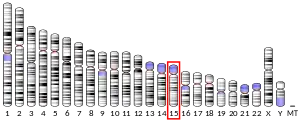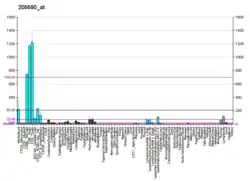RAS guanyl-releasing protein 1 is a protein that in humans is encoded by the RASGRP1 gene.[5][6][7]
Function
RAS guanyl nucleotide-releasing protein (RASGRP) is a member of a family of genes characterized by the presence of a Ras superfamily guanine nucleotide exchange factor (GEF) domain. It functions as a diacylglycerol (DAG)-regulated nucleotide exchange factor specifically activating Ras through the exchange of bound GDP for GTP. It activates the Erk/MAP kinase cascade and regulates T-cells and B-cells development, homeostasis and differentiation.[7]
Gene
Alternatively spliced transcript variants encoding different isoforms have been identified. The corresponding rat gene rbc7, which lacks a 5-prime exon, represents a 5-prime and 3-prime truncated version of a larger normal rat transcript that encodes a predicted 90-kD protein. This shorter transcript has not been found in humans.[7]
Clinical significance
In November 2016 a 12-year-old patient was hospitalized for repetitive infections. Scientists have assumed that a genetic problem might be the reason. More specifically, the genetic cause is a defect of the RASGRP1 gene which makes it inactive. .
RASGRP1 plays a role in the functions of natural killer cell dyneins. Since dyneins are motor proteins, their function is to circulate the elements inside the cells. Dr. Orange's laboratory studies have established a functional link between the defects of natural killer cells and dyneins, which in combination with Other observations led doctors to try the drug lenalidommide to treat the patient. The drug was able to reverse certain effects of the mutation RASGRP1.
References
- 1 2 3 GRCh38: Ensembl release 89: ENSG00000172575 - Ensembl, May 2017
- 1 2 3 GRCm38: Ensembl release 89: ENSMUSG00000027347 - Ensembl, May 2017
- ↑ "Human PubMed Reference:". National Center for Biotechnology Information, U.S. National Library of Medicine.
- ↑ "Mouse PubMed Reference:". National Center for Biotechnology Information, U.S. National Library of Medicine.
- ↑ Bottorff D, Ebinu J, Stone JC (May 1999). "RasGRP, a Ras activator: mouse and human cDNA sequences and chromosomal positions". Mamm Genome. 10 (4): 358–61. doi:10.1007/s003359901001. PMID 10087292. S2CID 34266456.
- ↑ Kawasaki H, Springett GM, Toki S, Canales JJ, Harlan P, Blumenstiel JP, Chen EJ, Bany IA, Mochizuki N, Ashbacher A, Matsuda M, Housman DE, Graybiel AM (Nov 1998). "A Rap guanine nucleotide exchange factor enriched highly in the basal ganglia". Proc Natl Acad Sci U S A. 95 (22): 13278–83. Bibcode:1998PNAS...9513278K. doi:10.1073/pnas.95.22.13278. PMC 23782. PMID 9789079.
- 1 2 3 "Entrez Gene: RASGRP1 RAS guanyl releasing protein 1 (calcium and DAG-regulated)".
Further reading
- Dower NA, Stang SL, Bottorff DA, Ebinu JO, Dickie P, Ostergaard HJ, Stone JC (2000). "RasGRP is essential for mouse thymocyte differentiation and TCR signaling". Nature Immunology. 1 (4): 317–21. doi:10.1038/79766. PMID 11017103. S2CID 7724240.
- Priatel JJ, Teh SJ, Dower NA, Stone JC, et al. (2002). "RasGRP1 Transduces Low-Grade TCR Signals Which Are Critical For T Cell Development, Homeostasis and Differentiation". Immunity. 17 (5): 617–27. doi:10.1016/S1074-7613(02)00451-X. PMID 12433368.
- Priatel JJ, Chen X, Zenewicz LA, Shen H, Harder KW, Horwitz MS, et al. (2007). "Chronic Immunodeficiency in Mice Lacking RasGRP1 Results in CD4 T Cell Immune Activation and Exhaustion". J. Immunol. 179 (4): 2143–52. doi:10.4049/jimmunol.179.4.2143. PMID 17675473.
- Priatel JJ, Chen X, Dhanji S, Abraham N, et al. (2006). "RasGRP1 Transmits Pro-Differentiation TCR Signaling that is Crucial for CD4 T Cell Development". J. Immunol. 177 (3): 1470–80. doi:10.4049/jimmunol.177.3.1470. PMID 16849453.
- Priatel JJ, Chen X, Huang YH, Chow MT, Zenewicz LA, Coughlin JJ, Shen H, Stone JC, Tan R, et al. (2010). "RasGRP1 regulates antigen-induced developmental programming by naive CD8 T cells". J. Immunol. 184 (2): 666–76. doi:10.4049/jimmunol.0803521. PMID 20007535.
- Ebinu JO, Bottorff DA, Chan EY, et al. (1998). "RasGRP, a Ras guanyl nucleotide- releasing protein with calcium- and diacylglycerol-binding motifs". Science. 280 (5366): 1082–6. Bibcode:1998Sci...280.1082E. doi:10.1126/science.280.5366.1082. PMID 9582122.
- Topham MK, Prescott SM (2001). "Diacylglycerol kinase zeta regulates Ras activation by a novel mechanism". J. Cell Biol. 152 (6): 1135–43. doi:10.1083/jcb.152.6.1135. PMC 2199204. PMID 11257115.
- Strausberg RL, Feingold EA, Grouse LH, et al. (2003). "Generation and initial analysis of more than 15,000 full-length human and mouse cDNA sequences". Proc. Natl. Acad. Sci. U.S.A. 99 (26): 16899–903. Bibcode:2002PNAS...9916899M. doi:10.1073/pnas.242603899. PMC 139241. PMID 12477932.
- Bivona TG, Pérez De Castro I, Ahearn IM, et al. (2003). "Phospholipase Cgamma activates Ras on the Golgi apparatus by means of RasGRP1". Nature. 424 (6949): 694–8. Bibcode:2003Natur.424..694B. doi:10.1038/nature01806. PMID 12845332. S2CID 4403046.
- Madani S, Hichami A, Cherkaoui-Malki M, et al. (2004). "Diacylglycerols containing Omega 3 and Omega 6 fatty acids bind to RasGRP and modulate MAP kinase activation". J. Biol. Chem. 279 (2): 1176–83. doi:10.1074/jbc.M306252200. PMID 14583629.
- Klinger MB, Guilbault B, Goulding RE, Kay RJ (2005). "Deregulated expression of RasGRP1 initiates thymic lymphomagenesis independently of T-cell receptors". Oncogene. 24 (16): 2695–704. doi:10.1038/sj.onc.1208334. PMID 15829980. S2CID 23262099.
- Liu Y, Zhu M, Nishida K, et al. (2007). "An essential role for RasGRP1 in mast cell function and IgE-mediated allergic response". J. Exp. Med. 204 (1): 93–103. doi:10.1084/jem.20061598. PMC 2118421. PMID 17190838.
- Roose JP, Mollenauer M, Ho M, et al. (2007). "Unusual interplay of two types of Ras activators, RasGRP and SOS, establishes sensitive and robust Ras activation in lymphocytes". Mol. Cell. Biol. 27 (7): 2732–45. doi:10.1128/MCB.01882-06. PMC 1899892. PMID 17283063.
- Ewing RM, Chu P, Elisma F, et al. (2007). "Large-scale mapping of human protein-protein interactions by mass spectrometry". Mol. Syst. Biol. 3 (1): 89. doi:10.1038/msb4100134. PMC 1847948. PMID 17353931.
- Pasvolsky R, Feigelson SW, Kilic SS, et al. (2007). "A LAD-III syndrome is associated with defective expression of the Rap-1 activator CalDAG-GEFI in lymphocytes, neutrophils, and platelets". J. Exp. Med. 204 (7): 1571–82. doi:10.1084/jem.20070058. PMC 2118641. PMID 17576779.
- Kosco KA, Cerignoli F, Williams S, et al. (2007). "SKAP55 modulates T cell antigen receptor-induced activation of the Ras-Erk-AP1 pathway by binding RasGRP1". Mol. Immunol. 45 (2): 510–22. doi:10.1016/j.molimm.2007.05.024. PMID 17658605.
- Yasuda S, Stevens RL, Terada T, et al. (2007). "Defective expression of Ras guanyl nucleotide-releasing protein 1 in a subset of patients with systemic lupus erythematosus". J. Immunol. 179 (7): 4890–900. doi:10.4049/jimmunol.179.7.4890. PMID 17878389.
External links
- RASGRP1 human gene location in the UCSC Genome Browser.
- RASGRP1 human gene details in the UCSC Genome Browser.
This article incorporates text from the United States National Library of Medicine, which is in the public domain.




